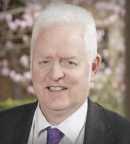
Mark Lawler, PhD, FRCPath

Satish Gopal, MD, MPH
This is a critical time for cancer research and cancer care across the world, and the cancer community has clearly highlighted the need for greater and more equitable international collaboration. Addressing the global cancer challenge is a significant undertaking, and it has become more urgent as a result of the COVID-19 pandemic. Data from the Special Network on COVID-19 and Cancer of the European Cancer Organization (ECO) indicate that nearly 1 million European citizens may be living with undiagnosed cancer due to missed health-care visits during the pandemic.1
We are in a race against time to find these undiagnosed cancers before they present at stages when treatment will be more difficult and less successful. Data such as these prompted ECO to launch a Time to Act campaign (www.europeancancer.org/TimeToAct). In the United States, nearly 10 million cancer screening tests were missed during the first 7 months of the pandemic,2 and it may take a decade to recover from COVID’s disastrous impact, prompting a national call to action on cancer screening and early detection as part of the reignited Cancer Moonshot.
Ending Cancer for Everyone Everywhere
The COVID-19 pandemic has exposed the lack of resilience of cancer services worldwide along with the critical importance of international collaboration to address common public health threats. Through initiatives such as the Cancer Moonshot, Europe’s Beating Cancer Plan, the European Union Mission on Cancer, and the United Kingdom War on Cancer, we have an opportunity to reimagine cancer services and cancer care on a global scale and strive to “end cancer as we know it” for everyone everywhere.
That goal is at the heart of the Center for Global Health of the National Cancer Institute (NCI), which this year celebrated its 11th anniversary. The Center for Global Health was created to facilitate collaborative cancer research with partners worldwide and to help realize the aspiration that cancer research anywhere can benefit people everywhere. As another example, a recent paper published in TheLancet Oncology 3 highlighted the need for more cancer research collaboration between the United States and the United Kingdom, two powerhouses of cancer research, in the context of the first Bilateral Cancer Summit, which was held in November 2021, pursuant to the G20 Summit in June 2021. The article particularly emphasized the need to increase collaborations between the two countries to deliver a broader portfolio of research to low- and middle-income countries, where nearly 70% of global cancer deaths will occur by 2040.3
Declaring a New War on Cancer
On February 2, 2022, President Biden announced the relaunch of the Cancer Moonshot, with an aim of reducing cancer deaths in the United States by 50% in the next 25 years.4 On World Cancer Day, 2 days later, Sajid Javid, England’s Secretary of State for Health and Social Care, declared a “war on cancer,” echoing the sentiment 50 years ago in the United States, which led to the signing of the National Cancer Act of 1971 by President Nixon.
On February 16, 2022, the European Parliament ratified Europe’s Beating Cancer Plan, the first time that Europe has developed a consolidated plan to address a disease that has now overtaken cardiovascular disease as the most common cause of premature death in some high-income countries and some upper middle–income countries.5 This unprecedented fortnight of high-level activity represents a crucial inflection point for patients with cancer and those at risk of developing cancer.
A United States–United Kingdom–European Union axis on cancer could radically shift the dial, providing leadership, tools, and expertise to tackle this deadly disease—which is the leading cause of death worldwide, accounting for nearly 10 million deaths in 2020. This collaboration on a truly global scale has health equity as a primary objective.
Working Together to Conquer Cancer
Working together and for everyone is the key to success. In this regard, we should reflect on an initiative started more than 20 years ago that demonstrates the power of collaboration in saving people’s lives. In 1999, pursuant to the Belfast Agreement, also known as the Good Friday Agreement, signed into law the previous year, a Memorandum of Understanding was signed in Belfast between the Departments of Health in Ireland and Northern Ireland and the NCI, creating the Ireland–Northern Ireland–NCI Cancer Consortium. This tripartite partnership aimed “to reduce cancer incidence and mortality on the island of Ireland through cross-border and transatlantic collaborations in cancer research and education.”
“Nearly 1 million European citizens may be living with undiagnosed cancer due to missed health-care visits during the pandemic.”— Marc Lawler, PhD, FRCPath and Satish Gopal, MD, MPH
Tweet this quote
Its impact has been transformative, doubling collaborative cancer research in Ireland, enhancing its quality, and creating an infrastructure that has delivered cancer clinical trials to more than 35,000 patients and saved thousands of lives.6 During this period, Northern Ireland achieved the best survival rates for breast cancer in the UK, and there were significant improvements in esophageal cancer outcomes across the island.7
Working collaboratively, as we know we can from initiatives like the Ireland–Northern Ireland–NCI Cancer Consortium, is clearly the path forward. We need greater, more inclusive, and more equitable global collaboration to achieve the progress against cancer we desire. These kinds of partnerships, multiplied around the globe, can have an enormous impact. Cancer knows no borders, and neither can we.
DISCLOSURE: Dr. Lawler has received honoraria from Bayer, Carnall Farrar, EMD Serono, Novartis, Pfizer, and Roche. Dr. Gopal reported no conflicts of interest.
REFERENCES
1. ecancer: ECO calls for urgent action as one million cancer cases are undiagnosed in Europe due to COVID-19. Available at https://ecancer.org/en/news/20256-eco-calls-for-urgent-action-as-one-million-cancer-cases-are-undiagnosed-in-europe-due-to-covid-19. Accessed July 18, 2022.
2. American Association for Cancer Research: AACR report on the impact of COVID-19 on cancer research and patient care. February 9, 2022. Available at www.aacr.org/professionals/research/aacr-covid-19-and-cancer-report-2022/. Accessed July 18, 2022.
3. Sullivan R, Lewison G, Torode J, et al: Cancer research collaboration between the UK and the USA: Reflections on the 2021 G20 Summit announcement. Lancet Oncol 23:460-462, 2022.
4. The White House: Fact Sheet: President Biden Reignites Cancer Moonshot to End Cancer as We Know It. Available at www.whitehouse.gov/briefing-room/statements-releases/2022/02/02/fact-sheet-president-biden-reignites-cancer-moonshot-to-end-cancer-as-we-know-it/. Accessed July 18, 2022.
5. Dagenais GR, Leong DP, Rangarajan S, et al: Variations in common diseases, hospital admissions, and deaths in middle-aged adults in 21 countries from five continents (PURE): A prospective cohort study. Lancet 395:785-794, 2020.
6. Lewison G, Gavin A, McCallion K, et al: The ‘Good Friday Agreement’ and cancer research on the island of Ireland: Evidence for the impact of a tripartite cancer research partnership. Eur J Cancer 129:15-22, 2020.
7. Lawler M, Gavin A, Salto-Tellez M, et al: Delivering a research-enabled multi-stakeholder partnership for enhanced patient care at a population level: The Northern Ireland Comprehensive Cancer Program. Cancer 122:664-673, 2016.
Dr. Lawler is Associate Pro-Vice-Chancellor, Professor of Digital Health and Chair in Translational Cancer Genomics, Queen’s University Belfast, Northern Ireland. Dr. Lawler was the architect of the European Cancer Patient’s Bill of Rights, which received the 2018 European Health Award. Dr. Gopal is Director of the Center for Global Health of the National Cancer Institute (NCI) and a member of the Steering Group of the Ireland–Northern Ireland–NCI Cancer Consortium.
Disclaimer: This commentary represents the views of the author and may not necessarily reflect the views of ASCO or The ASCO Post.

